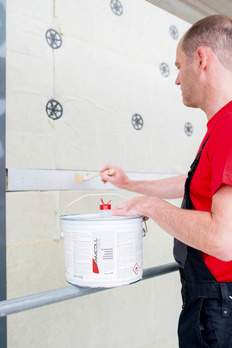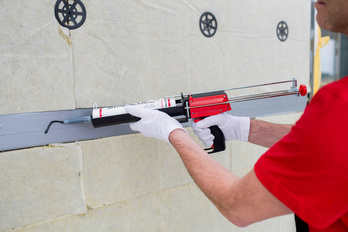For detailed information, other images and documents, please select individual articles from the following table.
STAMCOLL AS adhesive and sealant
For bonding Stamisol overlaps and connecting to roofs and façades
Register now and access more than 60,000 products


Variants
Register now and access more than 60,000 products
Call customer service: +43 50 8242 0
Prices for customers after login
- Very good adhesion without primer on many substrates – even under water load
- Good resistance to weathering and ageing
- Suitable for indoor and outdoor use
- Fast curing even with high layer thicknesses
- Permanently elastic – for stress-equalizing bonding and dynamic loads
- Almost odourless
- Excellent resistance to chemicals and heat
- Free of solvents, isocyanates, silicone
- Repaintable, resprayable
Before using the adhesive/sealant, the user should ensure that the materials in the contact area (solid, liquid and gaseous) are compatible with the adhesive/sealant and do not damage or change them (for example discolour). For construction materials that are subsequently processed in the area of the adhesive/sealant, the user should check in advance that their ingredients or vapours cannot lead to any impairments or changes (e.g. discolouration) of the adhesive/sealant. Where appropriate, the user should consult the respective manufacturer of the construction materials.


This information is only a recommendation based on our experience. Preliminary testing required!
Stamisol adhesive/sealant STAMCOLL AS from the cartridge
- is a high-quality, single-component adhesive/sealant based on silane-terminated polymers
- Hardens by reaction with moisture
Compatibility: Inks, paints, plastics and other coating materials must be compatible with the adhesive sealant.
Cleaning: The application surfaces must be cleaned and any contamination, such as release agents, preservatives, grease, oil, dust, water, old adhesive/sealants or other adhesion-inhibiting substances must be removed.
Cleaner for non‐porous surfaces: Cleaning should be carried out with acetone cleaner (art. no. 0893 460, 0893 460 002) or IPA cleaner (art. no. 0893 223 500; 0893 223 505) and a clean, lint-free cloth (art. no. 0899 810).
Avoiding air pockets: To achieve optimum adhesion and good mechanical properties, the inclusion of air must be avoided. Due to the large number of possible influences during processing and application, sample processing and application must be carried out by the user. The specific use by date can be found on the container and must be observed.
Select RAL-colour code
!! NOTE: On-screen visualisation of the colour differs from real colour shade!!










